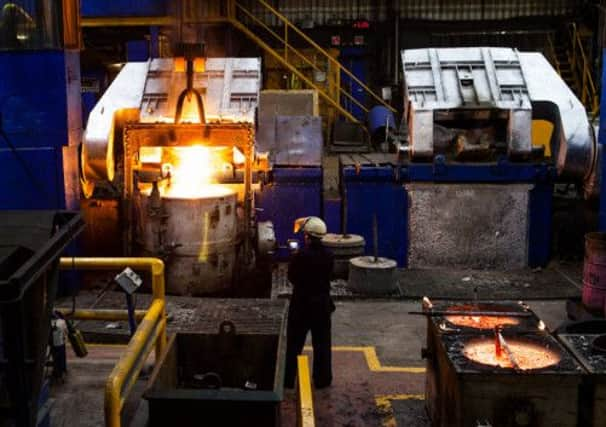Weir pumps up the volume as new facility sees output rocket


According to the Confederation of British Industry, UK manufacturers enjoyed their fastest growth in output for two years over the three months to August. One of the success stories can be found in a corner of West Yorkshire in the market town of Todmorden.
The Weir Minerals’ plant on the edge of the town houses the firm’s European headquarters and a workforce of 419. From here, the company works with some of the leading global operators in the mining, sand and gravel, power and general industrial sectors.
Advertisement
Hide AdAdvertisement
Hide AdMost recently, Weir has invested more than £5m in a foundry extension in Todmorden to ensure that capacity can be increased to meet continued growth in demand.
Today, the six-month-old building is a hive of activity and plays a key part in Weir’s production of pumps, valves and impellers (fan-like parts which push slurry through pipes). The new facility will increase total output in tonnage terms by almost 20 per cent, from 13,000 tonnes in 2012 to 15,500 tonnes by the end of the year.
Such is the company’s good-standing in the town that not one single objection was lodged during the planning process.
Bill Mannion, operations director at Weir, said: “Todmorden is a fantastic place to work. We have a good neighbours policy here and we have open days where a lot of the locals come round. We have a good relationship with Todmorden.”
Advertisement
Hide AdAdvertisement
Hide AdThere is a long history of manufacturing in Todmorden. In amongst Weir’s offices, pattern and machine shops and warehouses stands one of the site’s original buildings, which dates back to 1893 when a small local private foundry was established, manufacturing parts to service the cotton mills.
Over the years the company has changed hands and changed names a number of times until, in 1999, Weir Warman Limited was taken over by Weir Pumps. Seven years later the firm became Weir Minerals Europe Limited. Last year, it acquired Gema, a service business based in Gallivare, Northern Sweden.
The company is proud of its long record in West Yorkshire and tends to recruit from the local area. Mindful of its legacy and keen to protect and promote its special skills-set, it sets great store by its apprenticeship scheme.
At present, there are ten apprentices in Todmorden and a further six previous apprentices are in full-time employment. A graduate training programme was launched in September 2011 with an initial two engineering graduates taken on.
Advertisement
Hide AdAdvertisement
Hide AdSo, what are these apprentices taught? Put simply, they learn how to make things and, if all goes well, will go on to prove that British manufacturing is second to none.
“Apprenticeships are so important,” said Mannion. “This is something we will continue to do. We have got to pass our legacy on to them. Our industry has gone beyond hammers and spanners, it is so diverse now.”
The apprentices are given a chance to experience every element of the Weir business. This means working on the development of high performance equipment that is then shipped across the world.
Some of the far-flung destinations include mines and plants across Canada, Chile and Finland. Five years ago, Weir secured its first purchase order from China. Staff were so chuffed they framed it.
Advertisement
Hide AdAdvertisement
Hide AdIn addition to the wide range of customers across the globe, Weir also has manufacturing capability on every continent. There are 22 Weir Minerals sites in Europe alone.
Weir believes that one of the keys to its success – and continued expansion in the face of adverse economic conditions – is its commitment to service.
Mannion said: “We keep in close contact with our customers, we understand what they need. We have the relationship with our customers and are always looking at what is our next requirement for that customer.”
In recent years, Weir has invested heavily in its service presence across Europe in an effort to develop closer ties with its clients, including a raft of new service centres in countries such as Germany, Hungary, Spain and Poland. More than 90 per cent of Weir Minerals Europe’s revenue comes from overseas sales.
Advertisement
Hide AdAdvertisement
Hide AdBut Weir might not be in such robust shape (and be able to boast a 90 per cent retention of aftermarket business for servicing and replacing parts) if it had failed to modernise. A crucial element of this was adopting a ‘lean’ manufacturing approach.
Tony Locke, managing director of Weir Minerals Europe, explained: “By focussing on operational excellence and constantly improving the efficiency of the operation, we are able to compete in cost terms with other manufacturers based in countries with lower overheads.
“We have implemented and developed an advanced production-scheduling system that minimises wastage in the manufacturing process by aligning it very closely with the real-time demand we are seeing from customers. We are also always looking for ways to speed the process up without compromising on quality in order to maximise the value we can deliver to customers.”
The scale of the work undertaken by Weir is staggering: the largest pumps produced at Todmorden are over three metres in diameter and weigh more than 44 tonnes.
Advertisement
Hide AdAdvertisement
Hide AdThese pumps also require the largest individual castings, in which more than 20 tonnes of molten metal is poured into a single mould in just 54 seconds.
These components take several days to cool down before they can be finished and assembled into the final product.
The company produces and ships a pump of this size every three weeks.
A combination of the new facility and a state-of-the-art, automated moulding loop housed within it has significantly increased Weir’s production capacity.